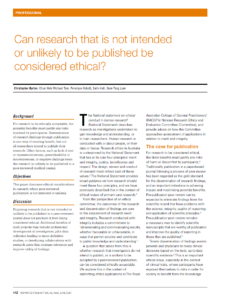 This paper on research ethics was published in the June 2017 edition of Australian Family Physician (PDF).
This paper on research ethics was published in the June 2017 edition of Australian Family Physician (PDF).
Barton C, Tam CWM, Abbott P, Hall S, Liaw S. Can research that is not intended or unlikely to be published be considered ethical? Australian family physician 2017 6/01;46:442-4.
Abstract
Background
For research to be ethically acceptable, the potential benefits must justify any risks involved for participants. Dissemination of research findings through publication is one way of creating benefit, but not all researchers intend to publish their research. Other factors, such as lack of size or representativeness, generalisability or innovativeness, or negative findings mean the research is unlikely to be published in a peer-reviewed medical journal.
Objective/s
This paper discusses ethical considerations in research where peer-reviewed publication is not intended or unlikely.
Discussion
Proposing research that is not intended or unlikely to be published in a peer-reviewed journal does not preclude it from being considered ethical. Additional benefits of such projects may include professional development of investigators, pilot data collection leading to more definitive studies, or developing collaborations with research users that increase relevance and improve utility of findings.
